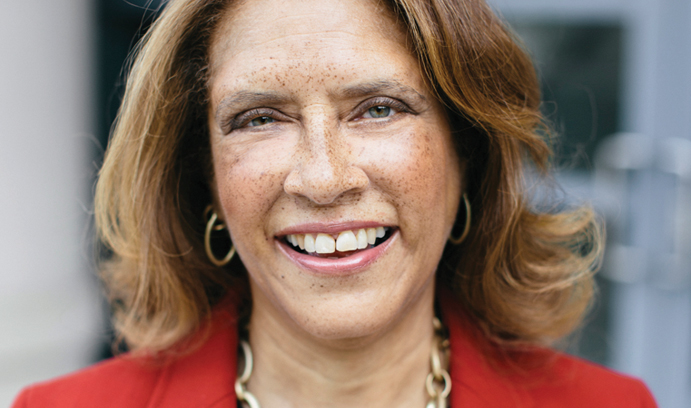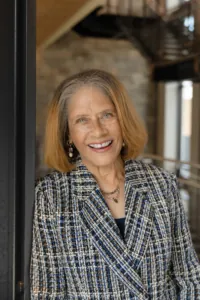
Lehigh College of Business Dean Georgette Chapman Phillips is retiring after 10 years. “It’s very hard to tell people to leave the workforce for two years, incur debt for two years, and then come out. The cost for our one-year MBA is about one half of other places.” Courtesy photo
When Georgette Chapman Phillips joined Lehigh University in 2014 as the Kevin L. and Lisa A. Clayton Dean of the College of Business, she was the college’s first female and first African American dean.
On the eve of her retirement 10 years on, she leaves a transformed business school, elevated in both public perception and academic offerings.
She launched a disruptive one-year full-time MBA modeled after leading European programs just two years into her deanship. She created a leading Flex MBA, a joint MBA/MPH with Lehigh’s College of Health, and master’s programs in management and business analytics. Faculty grew 23% during her leadership, from 79 to 97, buoyed by enhanced pathways to tenure and a focus on retention.
At the undergraduate level, she led an overhaul of the curriculum while adding a business analytics major and minors and in fintech and international business. She launched the Vistex Institute for Executive Education, Lehigh Business’ first foray in exec ed, with a robust mix of custom and open programs. And she led the college through the conception, fundraising, and opening of the new 74,000-square-foot Lehigh Business Innovation Building.
Today, the College of Business enrolls about 1,300 business undergrads, 400 business and engineering undergrads, and 300 graduate students.
Q&A WITH GEORGETTE CHAPMAN PHILLIPS
Phillips, who holds a JD degree from Harvard Law School, spent 22 years at the University of Pennsylvania, serving as vice dean and director of the Wharton Undergraduate Division. She was also the David B. Ford Professor of Real Estate, a professor of law, and a professor of Africana Studies in Penn’s School of Arts and Sciences. In addition to her duties as dean at Lehigh, she is a professor in the Perella Department of Finance and in the Africana Studies Program in the College of Arts and Sciences.
Phillips will step down June 30 after serving two five-year terms as Lehigh’s dean. The school’s search committee is expected to select finalists for the deanship this month.
Poets&Quants recently caught up with Phillips to talk about the transformation of Lehigh Business, why representation still matters, and what comes next. Our conversation has been edited for length and clarity.
First of all, congratulations on your upcoming retirement. I imagine you have mixed feelings about it.
Oh, of course. I mean, I love my job. Lehigh has been such a great place to work along with the people I’m working with within the administration, the faculty, and the students. You don’t leave something that you enjoy without mixed feelings. But I am looking forward to retirement.
Tell us a bit about your professional background, and your journey to Lehigh University.

Georgette Chapman Phillips
I started my academic career at the Wharton School at the University of Pennsylvania as an assistant professor untenured. As I was going through that process, the law school approached me and asked if I wanted a secondary department over there. So I really spent my time at Penn split between Wharton and law.
Then came time to really decide the path I was going to follow, and I really enjoyed the business path. So that’s when I became department chair at Wharton, and then vice dean for the undergraduate program. I found I really liked it because, while in the classroom, you can effectuate change. You can reach out to students and help them.
Also, my research was going gangbusters, but as vice dean, it was not clipping along at the pace that it formerly did. So then came the choice: Did I want to go further into administration? Or did I want to go back to faculty and do research? I chose administration. And the job at Lehigh came open, and it was tailor made for me.
How so?
It had really strong bones, as we say in real estate, but it had room to grow.
Going back to the choice between law and business, why did you choose the business path?
Undergraduates. I like both undergraduates and graduate students; I adore the mix. At one point I taught undergraduates, I taught MBAs, and I taught law students. They’re all very different. But becoming undergraduate dean just really fit me because I was really jazzed by the undergraduates.
How would you assess Lehigh University’s business school 10 years ago when you first took over as dean?
It had the runway to grow. I mean, quite frankly, there are some schools that, through a combination of students, administration, and faculty, they’re never going to be more than what they are. There are some schools that are already built out and, really, your highest and best there is to screw it up.
Lehigh fit that sweet spot: It had really talented students, very talented faculty, and an administration that had an appetite for change. I made it very clear when I interviewed that I have got to be able to make very hard decisions here. And I did and the administration backed me up.
What were some of your immediate goals for the business school when you started?
The first thing that we needed to do was flush out our graduate programs. They historically had a part-time program, which was very good, but you’re never gonna make your bones in the business school world with a part-time MBA program. You need that full-time program.
I said we are going to create a full-time program over one year. Back then, people looked at me like I had two heads. They said, “that’s impossible.” I said, “No, it’s just hard.” And we did it.
So our MBA is one calendar year, not two semesters, and it’s a great program. We have great placement. I’m very proud.
We also took the part-time program and rebranded it into the Flex program. Our big selling point is you do the MBA the way you want to do it. We are completely flexible. That has also grown, and I continue to be proud of that program.
And how long has the one-year MBA been up and running?
The first class was 2017, so we’ve hit the five-year mark. We have about 25 MBAs a year in that program.
And what do people say now? Have the skeptics come around?
Well, that’s interesting. The dynamics of the situation is that most of the skeptics have left Lehigh. But, other schools are doing similar things now. Penn State just did it. It’s no longer considered weird.
Well, in Europe, the one-year MBA is king. Do you think we might see more such programs in the U.S.?
Yes, I modeled our program off INSEAD’s.
I do think we’ll see more of them in the U.S., unless you’re in the top seven or 10 schools, depending on how you want to count. Wharton will not do a one-year MBA. Harvard, Stanford, Chicago, they’re not going to be doing one-year. People are willing to pay the price for that pedigree of those two-year programs. But that’s not what we compete against.
It’s very hard to tell people to leave the workforce for two years, incur debt for two years, and then come out. The cost for our one-year MBA is about one half of other places. These are for people who are serious about getting their MBA, not people who just want to play in that second semester of the second year.
Are there other graduate business programs of which you’re particularly proud?
We have a Master’s in Business Analytics now. Lehigh is a technical university, and there are a lot of people who want these kinds of technical degrees. So the MSBA is really, really important.
We’ve continued on with our very successful Master’s in Financial Engineering. These are quant jocks, and Wall Street just eats them up with a spoon. I mean, we have such good placement and high high salaries.
That degree is run between the business school, the math department, and industrial engineering. I don’t know of anybody else that does a degree like that between three different schools.
NEXT PAGE: Lehigh’s transformed undergrad and executive programs + Why representation still matters











Questions about this article? Email us or leave a comment below.